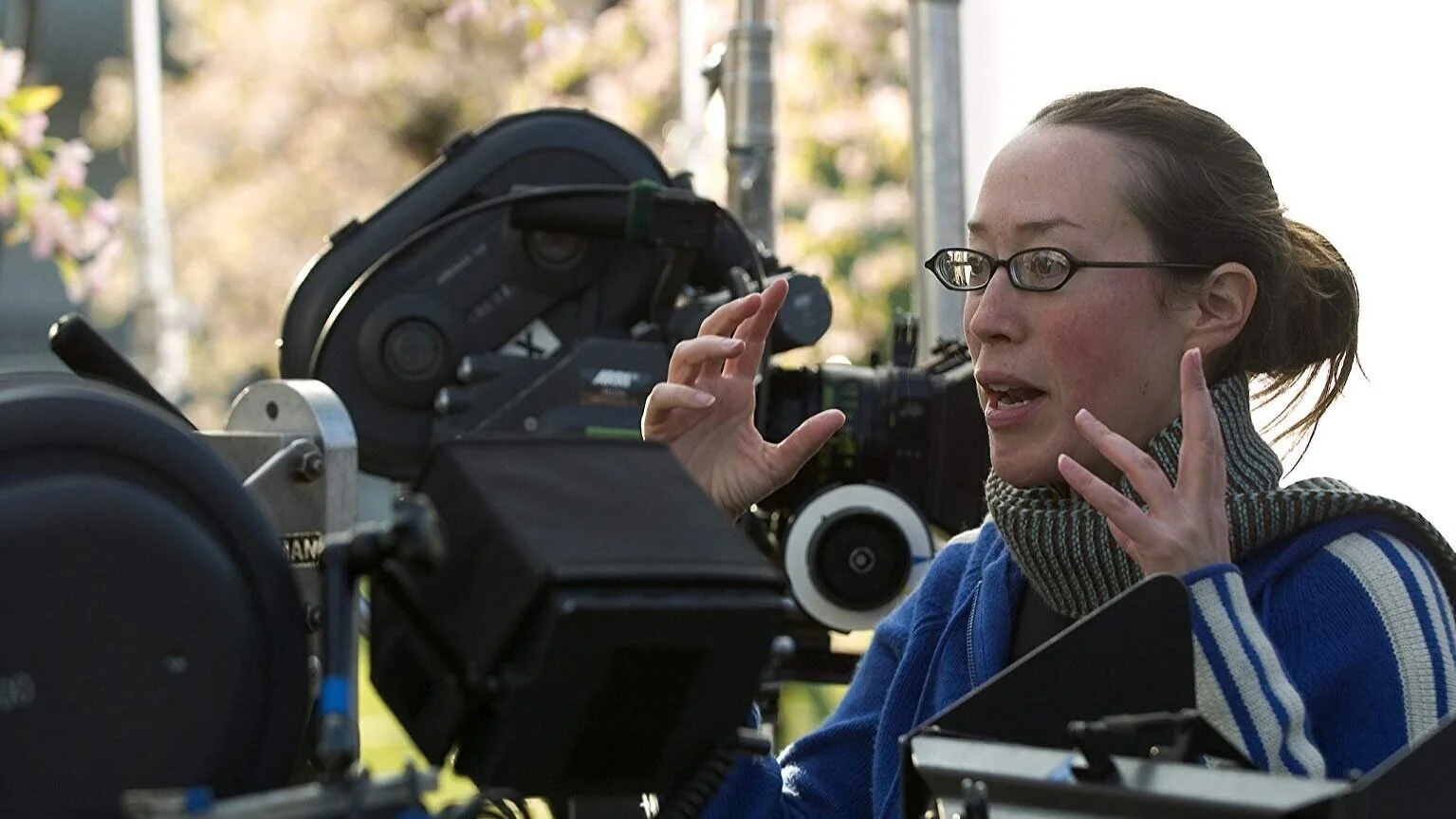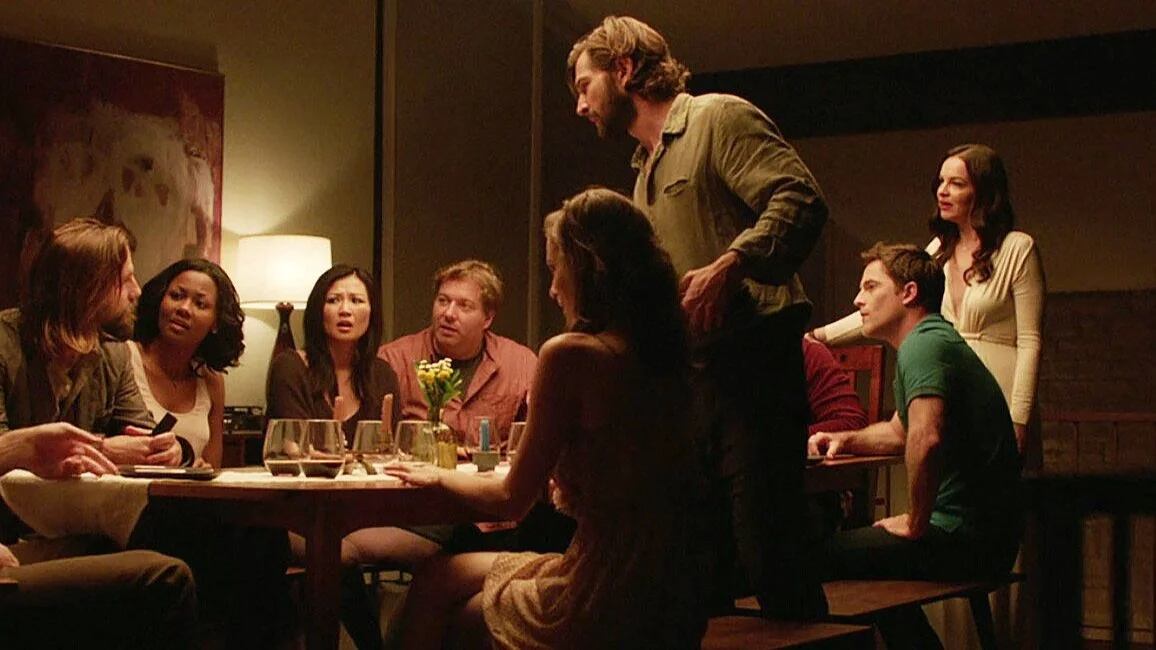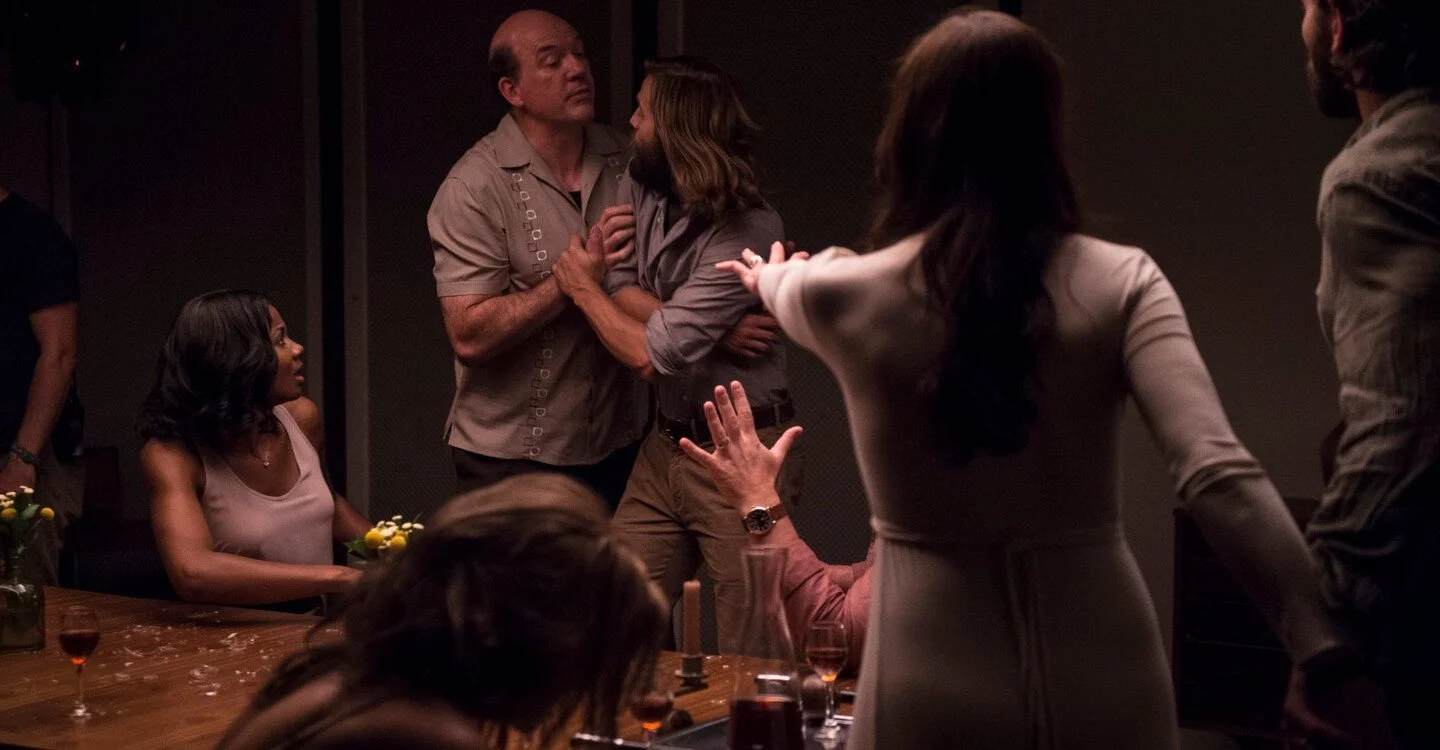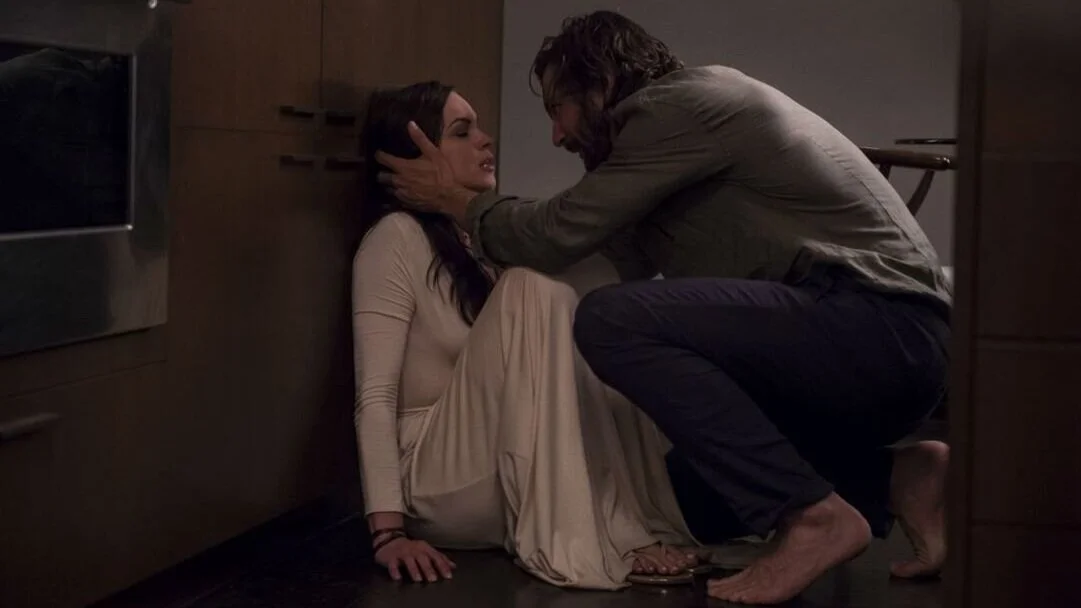[Editorial] The Invitation - Grief, Guilt And Manipulation in Karyn Kusama’s Cult Horror
Karyn Kusama’s The Invitation (2015) is renowned as an excruciating slow burn. At least before its explosive finale, the film is like watching one of the most awkward, inappropriate dinner parties ever to unravel before our eyes. For anyone who hates oversharing, conspicuous emotion and confrontation, this is a true experience of horror.
The Invitation is a cult movie. As in, it’s a movie about a cult, not a movie that has gained underground appreciation after being initially underestimated (although actually, also kind of that).
It’s a horror film built around history and secrets. There’s some graphic violence and a couple of effective jumps but really the scares creep up, born of disorientation and suspicion. Kusama manipulates her audience as blatantly as the cult members manipulate their ‘guests’. She leads us down one path, allowing us to glimpse and collect moments like jigsaw pieces, then she turns us around on ourselves, only to leave us dizzy and groping for assurance.
Eden (Tammy Blanchard) and David (Michiel Huisman - who’s earning a bit of a ‘type’ after playing a different creepy cultist in another female-directed horror, Malgorzata Szumowska’s The Other Lamb in 2019) are hosting an extravagant dinner party to which they’ve invited a group of Eden’s old friends, her ex-husband Will (Logan Marshall-Green) and his girlfriend Kira (Emayatzy Corinealdi). After 2 years apart following the death of Will and Eden’s son, it’s time to get the gang back together for good food and cringe-worthy exchanges. The setting is an impressive modern house crouched in the shadow of the Hollywood sign, the invite is on high-grade paper, and the wine offering is impressive to those who appreciate such things.
Karyn Kusama
This is a cult at the elite end of the spectrum; there are no grubby-faced children playing in the dust and scrounging for food - this is indoctrination as lifestyle goals. The friends discuss ‘The Invitation’ like it’s the latest trend and at one point someone excuses their hosts’ increasingly bizarre behaviour as, “Yeah they’re a little weird, but this is LA”.
For those playing along at home, however, there are plenty of red flags to tick off your culty bingo card. A waif-like hanger-on (Lindsay Burdge as Sadie - assumedly a direct reference to Susan Denise Atkins aka Sexy Sadie, member of the murderous Manson Family cult of late-60s California) has moved in and delivers the aggressive sexual freedom and spaced-out manic enthusiasm we’ve come to expect of our cultists. In what’s doubtlessly another reference to Manson’s followers, David ominously proclaims to a visibly unenthusiastic Will, “You’re part of our family... all of you are.” There’s also an increasingly apparent reluctance to let any of the guests leave with the house acting as a compound, and naturally, there’s plenty of emotional manipulation and drugs to keep people compliant.
Kusama anchors the story in an exploration of grief and guilt. Eden is attempting to exorcise her pain through ‘The Invitation’, while Will is plagued by flashbacks of his son and the accident that killed him. But a plague to one man is a feast to another. Stoic yet intimidating cult member Pruitt (John Carroll Lynch), in one of the film’s most captivating and jarring sequences, appears to have absorbed the teachings of ‘The Invitation’ to move past any guilt he felt over the violent murder of his wife. His address to the party - delivered as confession-through-party-game - feels less like remorse than self-granted absolution.
David instigates the inevitable organised-fun portion of the evening while looking down upon the party from a mezzanine, like a preacher from his pulpit. Far from being a bit of harmless fun, the game of ‘I Want…’ is used by the cult members to unsettle the other guests and promote their own agendas. This use of manipulation and inauthenticity is masterfully handled by Kusama as she explores how the characteristics of grief can mirror the artificiality of Hollywood and celebrity cults.
What are the public and private faces of dealing with loss? What are the public and private faces of functioning within society? What are the public and private faces of celebrity-endorsed religion?
The party is a masterclass in faking it, and LA is the perfect backdrop. The hosts and other cult members are all beatific smiles, looks held a little too long, and overfamiliarity. But scratch the surface and their pain shows through. Eden is adamant that pain is a choice, and we can assume that also applies to honesty, generosity, love and friendship.
Like Pruitt, Sadie uses her turn in the game of ‘I Want…’ to speak her mind, ostentatiously declaring her love to the group; in a classic power move employed by everyone from cults to abusive partners, she overdoes the affection, dazzling the other guests with her bold statement and almost daring them to challenge it. We don’t believe it and neither do they but it’s a proclamation almost impossible to deny, so she manipulates the party into a faux emotional connection (while creating more of that skin-crawly social awkwardness). Kusama deftly contrasts this display with the raw authenticity of the fond yet tentative greetings between the old friends, who have been through some shit and aren’t quite sure how to handle the reunion.
After a lavish dinner, David and Eden suggest the group should take a moment to “really look” at each other. But how can you really look at someone if they’re not showing you their true self? A toast is also made “to new beginnings” but the film asks the question: how can we begin anew if we’re still in denial about the past?
It’s satisfying when Will finally bursts out, “Why’s everyone acting so fucking polite?” The irony is that the cult members preach honesty and the confrontation of difficult emotions, but they can’t be honest with themselves or those around them.
Followers of ‘The Invitation’ deal with death in a forthright way but as is so often the way with cults, there’s no room for interpretation or challenge - which naturally sows the seeds for the events that follow.
“Skepticism can be contagious,” says the cult leader Dr Joseph (Toby Huss), and Will is our sceptical window into this story. Kusama plays with the idea that grief can make the world feel unsafe and uses it to create conflict with Will’s preoccupation with the past, his guilt and (possible) paranoia.
Will has more than one reason to be distrustful of his situation. As well as the odd behaviour of the cultists, he fundamentally doubts the possibility of moving on from tragedy. He admits to Kira the guilt he feels about his son’s death and that he has been waiting to die since the moment it happened. Kira assures him, “Moving forward is not a betrayal” but he is suspicious of Eden’s acceptance and says if that’s what letting go looks like, he wants none of it. This doubt in the face of a mother’s apparent recovery from the death of a young son reminds me strongly of Lars Von Trier’s Antichrist (2009), when She (Charlotte Gainsbourg) insists she is cured while He (Willem Dafoe) regards her with suspicion.
Kusama is also examining the legitimacy of a ‘therapy’ that promises a shortcut to escaping one’s grief and pain. Will is devastated by what he sees as Eden’s denial of the reality of what happened to their child - he doubts it but he’s also offended by it. The idea that Eden has so ‘easily’ moved on has a profound effect on his experience with his own grief and he cries, “It’s just that easy for you?” and “It meant something when he died. It was real. It is real.”
And it is. Ultimately, the most profound manipulation is of the cult members themselves. Following the catastrophic events of the evening, Eden admits to Will: “I miss him. I miss him so much.” The betrayal by the cult is surely that grief is not a choice. It’s more like a living entity and Eden hasn’t left it behind, it’s waiting for her as she makes her final choice and confesses, “This is the only way we can stop hurting.”
Will’s determination to hold onto his pain and guilt may not be productive in the short-term, but Kusama’s film is convincing in its assertion that recovery is a process we must feel and work through with brutal honesty to ourselves and those around us. Even as the world burns and the lights turn red, there is hope if we do the messy work and fight on through the horror.
At time of publishing, The Invitation is available in the UK to stream on Netflix and to rent from Prime Video.







![[Editorial] In Her Eyes: Helen Lyle in Candyman (1992)](https://images.squarespace-cdn.com/content/v1/5fe76a518d20536a3fbd7246/1649586854587-DSTKM28SSHB821NEY7AT/image1.jpg)
![[Editorial] Margaret Robinson: Hammer’s Puppeteer](https://images.squarespace-cdn.com/content/v1/5fe76a518d20536a3fbd7246/1630075489815-33JJN9LSGGKSQ68IGJ9H/MV5BMjAxMDcwNDI2Nl5BMl5BanBnXkFtZTcwOTMxODgzMQ%40%40._V1_.jpg)
![[Editorial] In Her Eyes: Tasya Vos in Possessor (2020)](https://images.squarespace-cdn.com/content/v1/5fe76a518d20536a3fbd7246/1667061747115-NTIJ7V5H2ULIEIF32GD0/Image+1+%285%29.jpg)
![[Editorial] The Babadook (2014)](https://images.squarespace-cdn.com/content/v1/5fe76a518d20536a3fbd7246/1651937631847-KR77SQHST1EJO2729G7A/Image+1.jpg)
![[Editorial] Sally Hardesty in The Texas Chainsaw Massacre (1974)](https://images.squarespace-cdn.com/content/v1/5fe76a518d20536a3fbd7246/1637247162929-519YCRBQL6LWXXAS8293/the-texas-chainsaw-final-girl-1626988801.jpeg)
![[Editorial] In Her Eyes: Sara Lowes in Witchfinder General (1968)](https://images.squarespace-cdn.com/content/v1/5fe76a518d20536a3fbd7246/1655655953171-8K41IZ1LXSR2YMKD7DW6/hilary-heath.jpeg)
![[Editorial] Sara in Creep 2 (2017)](https://images.squarespace-cdn.com/content/v1/5fe76a518d20536a3fbd7246/1646478850646-1LMY555QYGCM1GEXPZYM/27ebc013-d50a-4b5c-ad9c-8f8a9d07dc93.jpg)

![[Editorial] 5 Female Focused Horror Book Recommendations](https://images.squarespace-cdn.com/content/v1/5fe76a518d20536a3fbd7246/1696441981361-52EQCTJ7AT2QF1927GM7/919xtm6d3fL._AC_UF894%2C1000_QL80_.jpg)
![[Editorial] 9 Terrifying Cerebral Visions in Horror Movies](https://images.squarespace-cdn.com/content/v1/5fe76a518d20536a3fbd7246/1693509801235-X23OL50T1DVGECH0ZJK2/MV5BMjQ0MTg2MjQ4MV5BMl5BanBnXkFtZTgwMTU3NDgxMTI%40._V1_.jpg)
![[Mother of Fears] I Don’t Wanna Be Buried in a Pet Sematary (1989) and (2019)](https://images.squarespace-cdn.com/content/v1/5fe76a518d20536a3fbd7246/1691328766069-QFNAVJOMFZVZ5CLU1RWM/Screenshot+2023-08-06+at+14.23.13.png)
![[Editorial] 10 Films & Events to Catch at Soho Horror Film Fest 2023](https://images.squarespace-cdn.com/content/v1/5fe76a518d20536a3fbd7246/1700819417135-299R7L4P0B676AD3RO1X/Screenshot+2023-11-24+at+09.41.52.png)
![[Mother of Fears] Mothering in Silence in A Quiet Place (2018)](https://images.squarespace-cdn.com/content/v1/5fe76a518d20536a3fbd7246/1696445921315-HZJ2DZYQIH6VVWXBO2YL/Screenshot+2023-10-04+at+19.52.29.png)
![[Editorial] 9 Horror Nintendo Switch Games To Play](https://images.squarespace-cdn.com/content/v1/5fe76a518d20536a3fbd7246/1697214470057-3XZXX8N4LYIMDFWS6Z3P/Screenshot+2023-10-13+at+17.20.13.png)
![[Mother of Fears] Mother Vs. Monster in Silent Hill (2006)](https://images.squarespace-cdn.com/content/v1/5fe76a518d20536a3fbd7246/1695485781119-H6GNP0G3J2TLPAOIABV7/Screenshot+2023-09-23+at+17.11.56.png)
![[Editorial] 9 Best Slashers Released Within 10 Years of Scream (1996)](https://images.squarespace-cdn.com/content/v1/5fe76a518d20536a3fbd7246/1695478839037-LOFHGVM3H6BMSZW7G83M/Screenshot+2023-09-23+at+15.15.11.png)











When James Wan’s The Conjuring (2013) was first released, it set the tone for 2010s horror and was regarded by some horror fans as the beginning of a renaissance for the genre…